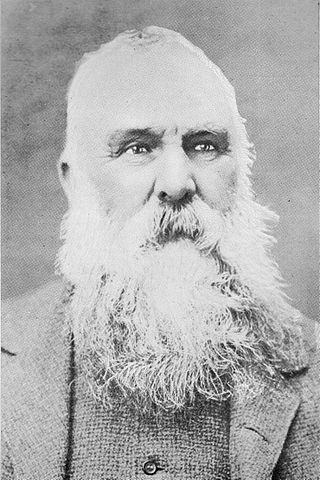Related Research Articles

Aberdare is a town in the Cynon Valley area of Rhondda Cynon Taf, Wales, at the confluence of the Rivers Dare (Dâr) and Cynon. Aberdare has a population of 39,550. Aberdare is 4 miles (6 km) south-west of Merthyr Tydfil, 20 miles (32 km) north-west of Cardiff and 22 miles (35 km) east-north-east of Swansea. During the 19th century it became a thriving industrial settlement, which was also notable for the vitality of its cultural life and as an important publishing centre.

Michael Daniel Jones was a Welsh Congregationalist minister and principal of a theological college, but is best remembered as a founder of the Welsh settlement in Patagonia known as Y Wladfa and as one of the fathers of modern Welsh nationalism.

David Williams was a Welsh Liberal Party politician who served for a short time as the Member of Parliament for the Merioneth constituency. Elected in 1868, he died in office the following year.

William Watkin Edward Wynne was a Welsh Conservative Party politician and antiquarian.
The Aberdare Urban District Council was established in 1894 and covered the parish of Aberdare. Its responsibilities included public health, sanitation, roads and public works generally.
Aberdare Local Board of Health was established in 1854 in response to the 1848 Public Health Act, and a report on the sanitary condition of the town conducted by Thomas Webster Rammell. It was eventually replaced in 1894 by Aberdare Urban District Council.
The Aberdare Urban District Council was established in 1894 and covered the parish of Aberdare. Its responsibilities included public health, sanitation, roads and public works generally.
The Aberdare Urban District Council was established in 1894 and covered the parish of Aberdare. Its responsibilities included public health, sanitation, roads and public works generally.
The Aberdare Urban District Council was established in 1894 and covered the parish of Aberdare. Its responsibilities included public health, sanitation, roads and public works generally.
The Aberdare Urban District Council was established in 1894 and covered the parish of Aberdare. Its responsibilities included public health, sanitation, roads and public works generally.
The Aberdare Urban District Council was established in 1894 and covered the parish of Aberdare. Its responsibilities included public health, sanitation, roads and public works generally.
The Aberdare Urban District Council was established in 1894 and covered the parish of Aberdare. Its responsibilities included public health, sanitation, roads and public works generally.
The Aberdare Urban District Council was established in 1894 and covered the parish of Aberdare. Its responsibilities included public health, sanitation, roads and public works generally.
The Aberdare Urban District Council was established in 1894 and covered the parish of Aberdare. Its responsibilities included public health, sanitation, roads and public works generally.
The Aberdare Urban District Council was established in 1894 and covered the parish of Aberdare. Its responsibilities included public health, sanitation, roads and public works generally.
The Aberdare Urban District Council was established in 1894 and covered the parish of Aberdare. Its responsibilities included public health, sanitation, roads and public works generally.
The Aberdare Urban District Council was established in 1894 and covered the parish of Aberdare. Its responsibilities included public health, sanitation, roads and public works generally.

William Robert Maurice Wynne of Peniarth, Merionethshire, often referred to as W.R.M. Wynne, was a Conservative politician and prominent landowner who also made a notable contribution to the cultural life of Wales by donating the Peniarth Manuscripts to the National Library of Wales, Aberystwyth. Wynne also served as Conservative MP for Merioneth from 1865 to 1868. He stood down in 1868 when facing likely defeat by the Liberal candidate David Williams, following the Second Reform Act.

St Elvan's Church is a Grade II* listed Anglican church in the centre of the town of Aberdare. It was built in 1851–1852, largely at the instigation of John Griffith, vicar of Aberdare from 1847 until 1859.

St John the Baptist's is an ancient parish church in the centre of the town of Aberdare, Wales.
References
- ↑ "Aberdare District Council Election. Result of the Poll". Aberdare Leader. 2 April 1904. Retrieved 13 June 2014.